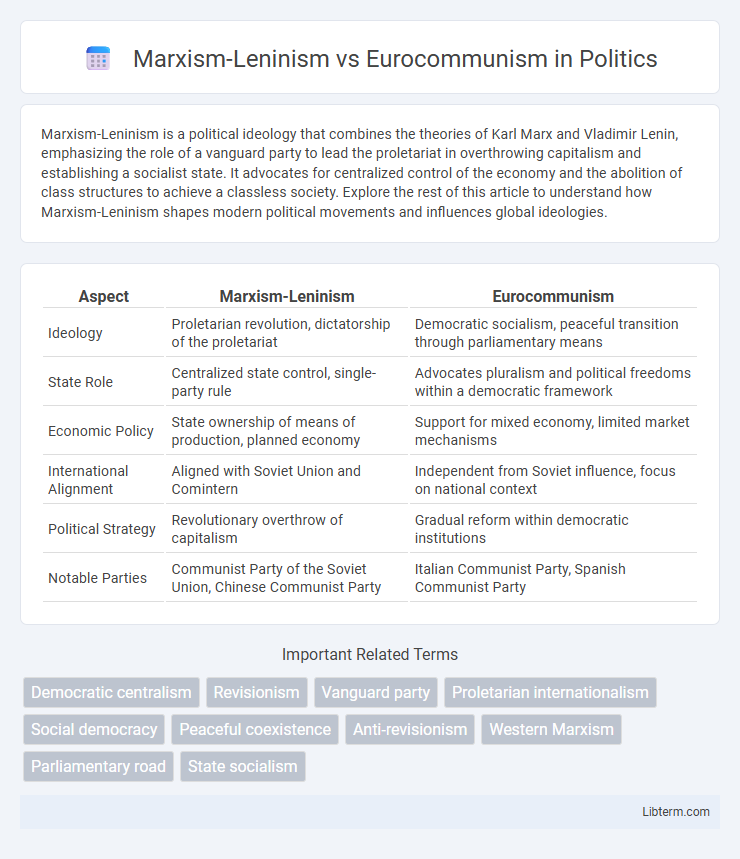Marxism-Leninism is a political ideology that combines the theories of Karl Marx and Vladimir Lenin, emphasizing the role of a vanguard party to lead the proletariat in overthrowing capitalism and establishing a socialist state. It advocates for centralized control of the economy and the abolition of class structures to achieve a classless society. Explore the rest of this article to understand how Marxism-Leninism shapes modern political movements and influences global ideologies.
Table of Comparison
| Aspect | Marxism-Leninism | Eurocommunism |
|---|---|---|
| Ideology | Proletarian revolution, dictatorship of the proletariat | Democratic socialism, peaceful transition through parliamentary means |
| State Role | Centralized state control, single-party rule | Advocates pluralism and political freedoms within a democratic framework |
| Economic Policy | State ownership of means of production, planned economy | Support for mixed economy, limited market mechanisms |
| International Alignment | Aligned with Soviet Union and Comintern | Independent from Soviet influence, focus on national context |
| Political Strategy | Revolutionary overthrow of capitalism | Gradual reform within democratic institutions |
| Notable Parties | Communist Party of the Soviet Union, Chinese Communist Party | Italian Communist Party, Spanish Communist Party |
Origins and Historical Context
Marxism-Leninism originated in the early 20th century as the ideological foundation of the Soviet Union, emphasizing a vanguard party and centralized state control to achieve proletarian revolution. Eurocommunism emerged in the 1970s among Western European communist parties seeking to distance themselves from Soviet influence by advocating democratic socialism and political pluralism. The historical context of Marxism-Leninism is rooted in the 1917 Bolshevik Revolution and Cold War dynamics, while Eurocommunism responded to the political liberalization and declining appeal of authoritarian models in post-war Europe.
Core Principles of Marxism-Leninism
Marxism-Leninism centers on the dictatorship of the proletariat, the vanguard party's leadership, and a planned economy aiming to achieve a classless society through revolutionary means. It emphasizes democratic centralism, strict party discipline, and the suppression of bourgeois elements to maintain workers' rule. In contrast, Eurocommunism advocates for achieving socialism through parliamentary democracy and greater political pluralism, rejecting authoritarianism and orthodox Leninist methods.
Foundations of Eurocommunism
Eurocommunism emerged in the 1970s as a reformist response to orthodox Marxism-Leninism, emphasizing democratic processes and political pluralism over centralized party control. Its foundations rest on autonomy from Soviet influence, advocating for socialism through parliamentary means rather than revolutionary dictatorship. Key proponents included the Italian Communist Party and the Spanish Communist Party, which sought to align socialist principles with Western democratic institutions and human rights.
Views on Revolutionary Change
Marxism-Leninism advocates for a proletarian revolution led by a vanguard party to establish a dictatorship of the proletariat as a necessary phase toward socialism. Eurocommunism emphasizes democratic processes and parliamentary participation, rejecting violent overthrow in favor of gradual reform within existing political structures. The divergent views reflect Marxism-Leninism's focus on revolutionary seizure of power, contrasted by Eurocommunism's commitment to pluralism and legal political engagement.
Relationship with the Soviet Union
Marxism-Leninism maintains a close, doctrinal alignment with the Soviet Union, emphasizing centralized control and adherence to Leninist principles as interpreted by the USSR. Eurocommunism represents a divergence from Soviet orthodoxy by advocating for greater political pluralism, democratic reforms, and independence from Soviet influence. This ideological rift shaped Cold War-era leftist movements, where Eurocommunist parties sought to distance themselves from Moscow's control to appeal to Western electorates.
Approach to Democracy and Pluralism
Marxism-Leninism advocates for a one-party state led by the communist party, emphasizing centralized control and the suppression of political pluralism to achieve a proletarian dictatorship. Eurocommunism promotes democratic socialism, embracing multiparty systems, political pluralism, and civil liberties while rejecting authoritarianism and advocating for coalition governance within parliamentary frameworks. The divergence reflects Marxism-Leninism's prioritization of revolutionary vanguardism versus Eurocommunism's commitment to democratic processes and political inclusivity.
Economic Policies and Strategies
Marxism-Leninism advocates for centralized economic planning and state ownership of the means of production, emphasizing rapid industrialization and collectivization to achieve a classless society. Eurocommunism, emerging in Western Europe, supports a mixed economy with elements of socialism, promoting democratic governance and market mechanisms alongside social welfare programs. While Marxism-Leninism prioritizes revolutionary transformation through a vanguard party, Eurocommunism favors gradual reforms within parliamentary systems to balance economic growth and social justice.
Stance on Nationalism and Internationalism
Marxism-Leninism emphasizes strict adherence to international proletarian solidarity, advocating for a centralized communist state with a global revolutionary agenda, often rejecting nationalism as a bourgeois distraction. Eurocommunism, emerging in Western Europe during the 1970s, promotes a more flexible approach, recognizing national cultural identities and advocating for a peaceful, democratic transition to socialism that respects national sovereignty. This divergence leads Marxism-Leninism to prioritize global class struggle, while Eurocommunism balances internationalism with national pluralism, seeking coalition politics within capitalist democracies.
Influence on Global Communist Movements
Marxism-Leninism, as the official ideology of the Soviet Union, significantly shaped global communist movements through strict adherence to centralized party control, revolutionary vanguardism, and the export of Soviet-style socialism, influencing countries in Eastern Europe, Asia, Africa, and Latin America. Eurocommunism emerged in the 1970s among Western European communist parties, promoting a more democratic, reformist, and independent approach that distanced itself from Soviet orthodoxy, impacting leftist movements by advocating political pluralism and integration with parliamentary systems. The ideological divergence between Marxism-Leninism and Eurocommunism created distinct global trajectories for communist activism, with the former driving state-centric revolutions and the latter fostering democratic socialism within capitalist democracies.
Contemporary Relevance and Legacy
Marxism-Leninism maintains a significant impact on contemporary politics through its emphasis on a centralized, vanguard-led state and revolutionary praxis, influencing regimes such as North Korea and Cuba. Eurocommunism, advocating for democratic socialism and political pluralism within capitalist societies, retains relevance in European leftist parties and social movements promoting human rights and pluralistic governance. The legacy of Marxism-Leninism persists in authoritarian socialist states, while Eurocommunism shapes progressive policy frameworks and democratic reforms in Western Europe.
Marxism-Leninism Infographic

 libterm.com
libterm.com